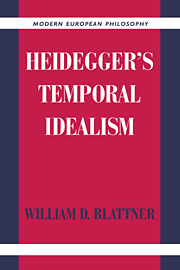Book contents
- Frontmatter
- Contents
- Acknowledgments
- A Note on Sources
- Introduction. Ontology, Phenomenology, and Temporality
- 1 Care as the Being of Dasein
- 2 Originary Temporality
- 3 World-Time and Time-Reckoning
- 4 The Ordinary Conception of Time and Disengaged
- 5 Heidegger's Temporal Idealism
- Conclusion. The Consequences of the Failure of Heidegger's Temporal Idealism
- Bibliography
- Index
3 - World-Time and Time-Reckoning
Published online by Cambridge University Press: 05 June 2012
- Frontmatter
- Contents
- Acknowledgments
- A Note on Sources
- Introduction. Ontology, Phenomenology, and Temporality
- 1 Care as the Being of Dasein
- 2 Originary Temporality
- 3 World-Time and Time-Reckoning
- 4 The Ordinary Conception of Time and Disengaged
- 5 Heidegger's Temporal Idealism
- Conclusion. The Consequences of the Failure of Heidegger's Temporal Idealism
- Bibliography
- Index
Summary
World-time is the flow of time experienced by Dasein in an everyday way. Originary temporality is not successive, but world-time is. World-time is the sequence of qualitative or contentful moments or spans of time that Dasein encounters in its everyday going about business. It is this sequence that Dasein thinks about when it reflects on time in a mundane fashion. In this chapter I aim to explicate Heidegger's phenomenology of worldtime; to explain the sort of human temporality in virtue of which, Heidegger argues, Dasein is able to encounter world-time; and to explain how world-time is supposed to be dependent upon originary temporality. This last task continues the argument launched in Chapter 2 for the thesis that originary temporality is indeed a mode of time, albeit a rather unusual one. For this claim depends, as we recall, upon the assertion that originary temporality consists of a set of features that, when modified, make up world-time, or as I abbreviated this idea above, that originary temporality is the explanatory core of world-time.
This chapter is divided into three sections. In the first I present and clarify Heidegger's phenomenology of world-time. Here I attempt to describe the way in which Dasein ordinarily and prereflectively encounters time. In the second and third sections I develop the thesis that worldtime explanatorily depends upon originary temporality. I approach that thesis from two “sides,” that of the understanding and that of the understood.
- Type
- Chapter
- Information
- Heidegger's Temporal Idealism , pp. 127 - 184Publisher: Cambridge University PressPrint publication year: 1999



